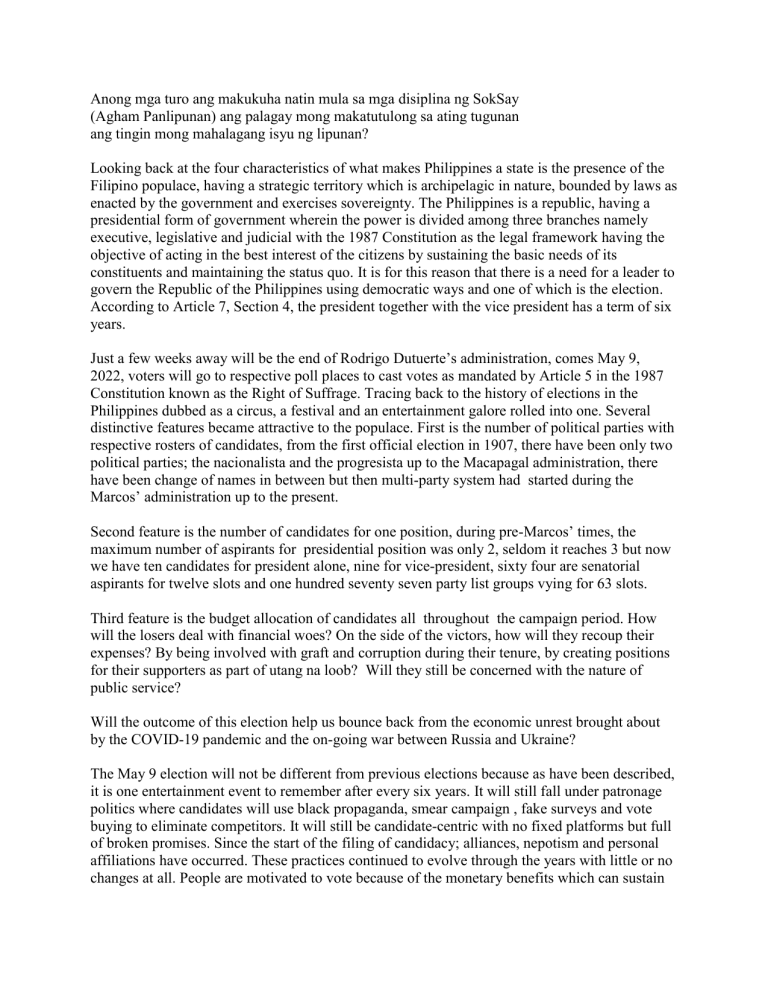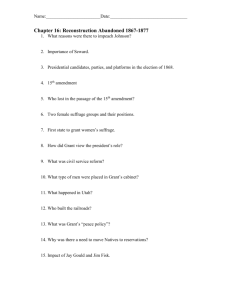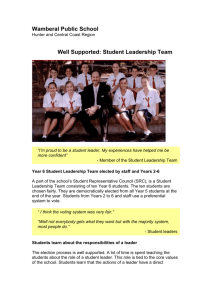
Anong mga turo ang makukuha natin mula sa mga disiplina ng SokSay (Agham Panlipunan) ang palagay mong makatutulong sa ating tugunan ang tingin mong mahalagang isyu ng lipunan? Looking back at the four characteristics of what makes Philippines a state is the presence of the Filipino populace, having a strategic territory which is archipelagic in nature, bounded by laws as enacted by the government and exercises sovereignty. The Philippines is a republic, having a presidential form of government wherein the power is divided among three branches namely executive, legislative and judicial with the 1987 Constitution as the legal framework having the objective of acting in the best interest of the citizens by sustaining the basic needs of its constituents and maintaining the status quo. It is for this reason that there is a need for a leader to govern the Republic of the Philippines using democratic ways and one of which is the election. According to Article 7, Section 4, the president together with the vice president has a term of six years. Just a few weeks away will be the end of Rodrigo Dutuerte’s administration, comes May 9, 2022, voters will go to respective poll places to cast votes as mandated by Article 5 in the 1987 Constitution known as the Right of Suffrage. Tracing back to the history of elections in the Philippines dubbed as a circus, a festival and an entertainment galore rolled into one. Several distinctive features became attractive to the populace. First is the number of political parties with respective rosters of candidates, from the first official election in 1907, there have been only two political parties; the nacionalista and the progresista up to the Macapagal administration, there have been change of names in between but then multi-party system had started during the Marcos’ administration up to the present. Second feature is the number of candidates for one position, during pre-Marcos’ times, the maximum number of aspirants for presidential position was only 2, seldom it reaches 3 but now we have ten candidates for president alone, nine for vice-president, sixty four are senatorial aspirants for twelve slots and one hundred seventy seven party list groups vying for 63 slots. Third feature is the budget allocation of candidates all throughout the campaign period. How will the losers deal with financial woes? On the side of the victors, how will they recoup their expenses? By being involved with graft and corruption during their tenure, by creating positions for their supporters as part of utang na loob? Will they still be concerned with the nature of public service? Will the outcome of this election help us bounce back from the economic unrest brought about by the COVID-19 pandemic and the on-going war between Russia and Ukraine? The May 9 election will not be different from previous elections because as have been described, it is one entertainment event to remember after every six years. It will still fall under patronage politics where candidates will use black propaganda, smear campaign , fake surveys and vote buying to eliminate competitors. It will still be candidate-centric with no fixed platforms but full of broken promises. Since the start of the filing of candidacy; alliances, nepotism and personal affiliations have occurred. These practices continued to evolve through the years with little or no changes at all. People are motivated to vote because of the monetary benefits which can sustain their survival for a period of time, without thinking of what could be the effects after election. The attitude of being resilient among Filipinos had become a daily practice even if survival becomes more difficult with each passing day. Being adaptable to changes had been one strength of Filipino culture. Despite the disparity in terms of social classes, still every dilemma can be a challenge but not a white flag to be raised. Eliminating patronage politics and nepotism can be hard tasks, because it is what is the system at present but definitely not permanent. The struggle for a clean and honest elections continues but we have to consider the backbone of the society which is the family, it will be the sanctuary for comfort that we will remain hopeful for; that the consciousness where integrity and honesty abounds will prevail. We will be the voices of the future generations who will advocate changes, it will be one tiring journey to trek on , everything will be done gradually and eventually realizing that patronage politics will no longer be the concern of every candidate but rather genuine public service to promote sustainable development goals for generations to come. The teachings from the different Social Science disciplines will help each one of us be more critical of the changes in our society though beset with political, economic and social problems, the ideas, theories, applications, interpretations and perspectives will help us understand our roles in the society and how we can help promote changes along the way. It will not just be a dream but rather everything will be real through being advocates of change, of helping raise awareness through education and information campaigns, of continuously seeking help and inspiration from our families and teachers as we become more critical and analytical with what we watch, hear and read especially on social media. We will be more vigilant with our actions by showing the values of kindness, understanding and compassion towards our fellowmen. But most of all, we will always be guided by our benevolent God that we can surpass every challenge graciously in accordance with His plan.



